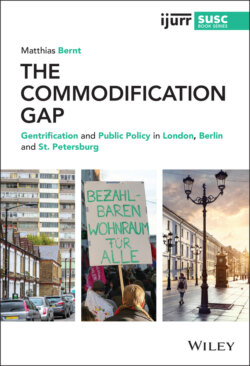The Commodification Gap

Реклама. ООО «ЛитРес», ИНН: 7719571260.
Оглавление
Matthias Bernt. The Commodification Gap
Table of Contents
List of Tables
List of Illustrations
Guide
Pages
IJURR‐SUSC Published Titles
THE COMMODIFICATION GAP. Gentrification and Public Policy in London, Berlin and St Petersburg
List of Figures
List of Tables
Series Editors’ Preface
Preface
CHAPTER 1 Introduction. Gentrification Between Universality and Particularity
How to Compare? Why Compare?
Concepts and Causation
Design of this Study
Notes
CHAPTER 2 Why the Rent Gap isn’t Enough
Where the Rent Gap Works Well
Where the Rent Gap Falls Short
When and Why does Capital Flow?
At Which Scale is the Rent Gap Positioned?
Which Rent?
Property as Control?
How is the Rent Gap Realised?
Embedding Gentrification
Economy, Society and States
The Commodification Gap
Notes
CHAPTER 3 Three Countries, Three Housing Systems
The British Experience
From Private Landlordism to a Dual Market
The Thatcherite Revolution
New Labour: More of the Same?
Austerity and New ‘Class War Conservatism’ Under the Coalition Government
Conclusion: Neoliberalism, Tenurial Transformation and Gentrification
The German Experience
From the Controlled Housing Economy to the Lücke Plan
The Design of Tenant Protections
The Conservative Wende
Reunification and Neoliberal Consensus
Conclusion: Gentrification Between Regulation and Deregulation
The Russian Experience
Housing in the Soviet Union
From Shock Therapy to Failing Markets21
Restricted State Capacities and Opportunity Planning
Conclusion: Gentrification in a Dysfunctional Market
State Intervention in Housing: Setting the Parameters for Gentrification
Notes
CHAPTER 4 Barnsbury: Gentrification and the Policies of Tenure
The Making of Early Gentrification
The Right to Buy: Pouring Fuel on the Fire
The New Economy of Gentrification
Capital Gains Instead of Owner‐Occupation
Penalty Renting
From Value Gap to Super‐gentrification
Notes
CHAPTER 5 Prenzlauer Berg: Gentrification Between Regulation and Deregulation
From Plan to Market
Rolling out the Market, Weakening Public Control
Since 2000: Privately Financed Refurbishments, Condominium Boom and No Regulation
New Build Gentrification and Energy Efficient Displacement
Between Deregulation and Re‐regulation
Gentrification with Brakes?
Notes
CHAPTER 6 Splintered Gentrification: St Petersburg, Russia1
Unpredictable Regeneration Schemes
World Heritage vs. Gentrification
The Dissolution of Kommunalki Flats
State‐run Repair and Renewal
Pro and Contra Gentrification
Notes
CHAPTER 7 The Commodification Gap. Universality vs. Particularity Revisited
Gentrification and Decommodification
Meeting the Challenge: New Directions for Research and Politics
Notes
Appendix A Compulsory Purchase in Barnsbury
Appendix B. Residents in NS‐SeC Classes 1 and 2
References
Index
WILEY END USER LICENSE AGREEMENT
Отрывок из книги
The Commodification Gap: Gentrification and Public Policy in London, Berlin and St Petersburg Matthias Bernt
.....
The New Chinese City: Globalization and Market Reform John R. Logan (ed.)
Cinema and the City: Film and Urban Societies in a Global Context Mark Shiel and Tony Fitzmaurice (eds.)
.....